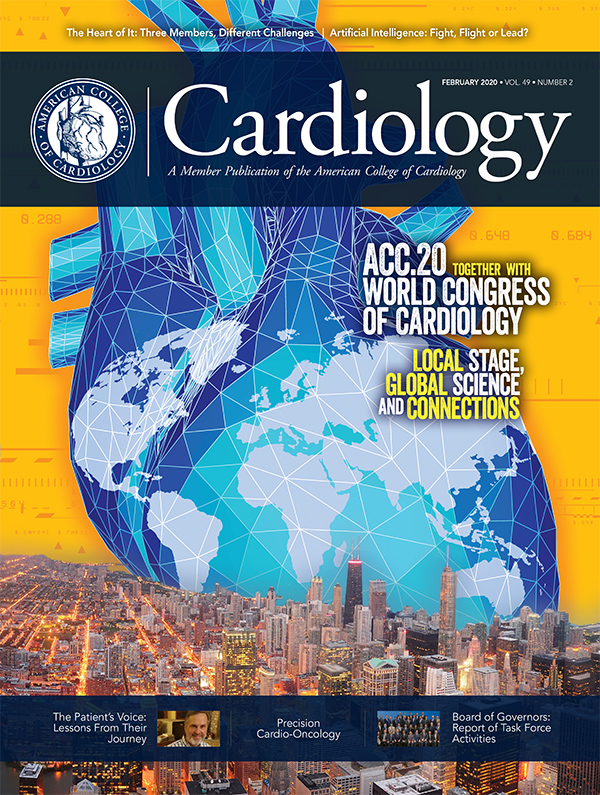Innovation at ACC | The Future of AI: Fight, Flight, or Lead?

One can hardly go a week without running into headlines like, AI Predicts Heart Attacks Better Than Doctors.
It's not difficult to imagine a future cardiology clinic visit to look like this: patients check in via facial recognition software; their health data, along with their dietary behavior, exercise activities and lifestyle habits are automatically downloaded from their personal health record device to an interoperable electronic health record (EHR).
Next, a humanized robot, complete with an echocardiographic probe, interacts with the patient to assess the history, perform the physical and make a management plan with prescriptions instantly dispensed.
At home, the patient participates in "smart" remote monitoring, including medication adjustments, artificial intelligence (AI)-guided coaching, and surveillance for complications or decompensation.
What's missing from this scenario?
A clinician!
Despite all the hype (and fear) that AI could replace clinicians, we're far from this scenario. Much of the technology exists to execute pieces of such a clinic visit, but that is a long way from implementation of safe, effective and efficient "AI for health care" solutions. Not to mention the human component.
Abraham Verghese, MD; Nigam Shah, MD; and Robert A. Harrington, MD, MACC, all from Stanford, wrote in a 2018 editorial in JAMA that the real potential for AI is to improve clinical efficiency, and not only avoid interfering with the clinician-patient interface, but instead enhance it.1

AI could actually increase humanism via augmented (not "artificial") intelligence, but we need a roadmap to achieve this.
What is certain in the short run is that a tidal wave of AI will enter the health care realm. The sooner we learn to surf this wave, the less likely we are to be smothered by it.
Samir R. Kapadia, MMBS, FACC, chair of cardiology at Cleveland Clinic has stated: "In the next three to five years, we will see a huge change in how we practice and how we teach. Whether doctors are exposed to it directly or indirectly, it's inevitable they will utilize information derived from AI."
In the tech world, health care AI is already a huge deal. AI start-up venture funding alone was greater than $1 billion just in the year 2018, and was on pace to have been higher in 2019. AI in health care will be a $25+ billion business by the middle of the 2020s.
This doesn't even count the large tech companies – Apple, Google/Verily, Facebook, Microsoft, Amazon, etc. – which are all making major forays into digital health and AI related to health and health care. Medical device and pharmaceutical companies are also rapidly developing AI teams and "solutions."
Why Now?

AI analytic techniques have been around for decades. Recently, however, exponential growth in computing power and digital data, coupled with a way to transfer digital data (the internet), have created the environment for AI to thrive.
As such, most sectors of the economy have undergone some form of "digital transformation," leveraging AI. Google, Amazon and Netflix – just to name a few – have become part of our daily lives.
Health care is behind, but is now squarely in the "big data" era, opening the door for AI. The exponential growth of health care digital data is not just from the EHR. Other sources such as genomic, biomarker, imaging and internet health data, as well as from wearable and nonwearable biosensors, are rapidly growing.
AI is an umbrella term for a field of computer science capable of handling massive amounts of such data, including techniques such as machine (or adaptive) learning, deep learning and cognitive computing. AI techniques can handle enormous data sets, beyond the capacity of the individual human brain and traditional biostatistical methods.
In these gigantic datasets, AI algorithms identify similar features, correlations and interactions. This yields clusters, or classification of groups of data in relation to the outcome of interest.
Importantly, these techniques are iterative – they can improve over time.
Mind the Gap: Lag Between AI's Potential and Application

Health care is ripe for AI, and hundreds of companies are developing health care solutions. Yet ... how can there be so much enthusiasm and excitement about AI, and so little change so far in the delivery of cardiology care?
The clinic exam room of 2019 looks essentially the same as it has for more than 50 years. Is AI more bark than bite?
This apparent lack of impact of AI on health care is for multiple reasons, but a couple deserve emphasis. First, at this stage there is still more hype than evidence for AI solutions in health care.
Given the stakes of health care, clinical validation and evidence are rightfully necessary for any tool that will be deployed in clinical care.
Second, there are limitations of AI analytics. For example, AI predictive models may change over time, and it can be difficult to know when the prediction model's performance changes.
Frank E. Harrell Jr., PhD, a biostatistics professor at Vanderbilt University, has questioned whether machine learning risk models are going to be helpful for clinical risk prediction, given the way these techniques classify risk.
He uses this analogy to explain: "A poker player wins because she is able to estimate the probability she will win based on her current hand, not because she recalls how often she's had such a hand when she won in the past."
Harrell raises concerns about AI analytics being a so-called black box or difficult to understand and interpret. Also, underlying data quality is critical: if AI analytics are applied to observational data sources like EHR, they could be inaccurate.
What's Next?

We're at an inflection point between hype and reality for AI in cardiology. To move forward, it can be helpful to consider where AI may be best deployed in the clinical practice of cardiology.
There are many potential applications, but four major areas include:2
- Imaging
- Algorithms – using known formulas or guidelines and mapping them to large datasets
- Prediction of risk and outcomes
- Diagnostic or treatment decision-making.
AI applications in cardiology will progress most rapidly for imaging applications, because the data quality tends to be high and is more straightforward to validate its results. This is also generally true for algorithms.
However, for risk and outcome predictions for clinical decision support – and definitely for diagnosis and treatment – it will take more time. The bar is higher for clinical validation and development of sufficient evidence for adoption into clinical practice.
In particular, robust evidence is needed before AI solutions are adopted for making diagnostic or treatment recommendations, because there is a real risk these could be inaccurate.
It is still "early days" for AI and health care, but the evidence base is starting to accumulate. There has been recent exponential growth in publications in cardiology applications and machine learning.
A rapid rise in the use of AI has been seen in fields outside cardiology, such as the interpretation of radiologic images, retinography, and in pathology where patterns in the tumor can be mapped to specific genetic mutations and guide therapy.
Within cardiology, we're starting to see preliminary studies that hint at real potential, even if not yet ready for "clinical prime time."
For example, in one preliminary study, AI was trained to identify and differentiate between standard echo 2D views with very high accuracy, and to recognize conditions such as hypertrophic cardiomyopathy, cardiac amyloid and pulmonary hypertension.3

Major companies like GE, Siemens and Phillips already use AI in their software, such as to optimize standard echo views and edge detection. While this is currently "in the background," it's not hard to imagine that it will not be very long – perhaps three to five years – when AI could be used to "pre-read" echocardiograms in clinical practice, with a high degree of accuracy.
As another example, a study recently published in The Lancet showed that among normal ECGs, AI could determine which patients had experienced atrial fibrillation in the past, with a high degree of accuracy.4
Another study used AI to evaluate patterns of aortic stenosis with characterization of more subtle degrees of disease and risk.5
This hints at another strength of AI – namely, that it can handle more data over time, and it can handle time-varying variables, which have been notoriously difficult to deal with in risk prediction.
What About the ACC?

Launched in 2017, the ACC Innovation Program is focused on creating a Roadmap for Healthcare Transformation that uses digital health, big data and precision health.6
The ACC Health Care Innovation Member Section launched in 2018. AI – including a path forward for collaborative development and deployment in clinical practice – is centric to these efforts.
Working and collaborating with the technology sector, the ACC is now leading projects on the deployment of digital health and AI solutions in clinical practice.
In addition, ACC has partnered with Yale University's Center for Outcomes Research and Evaluation (CORE), under the direction of Harlan Krumholz, MD, SM, FACC, to launch the Institute for Computational Health (ICH).
The goal of the ICH is to work with technology and other health care companies and health systems to develop AI applications, and execute clinical validation and then testing in clinical practice.
Preliminary work from the ICH has been published.7,8 The ACC's first Applied Artificial Intelligence Symposium was held in early December 2019 at Heart House in Washington, DC.
The Symposium brought together ACC member experts, along with patient/consumer, health system, industry and tech stakeholders to discuss the potential for AI in transforming health care delivery.
The day-long event outlined ACC's goals in the digital transformation space; how to move AI from concept to practice; and the importance of multi-stakeholder collaboration to effectively achieve applied AI.

ACC's innovation work is being noticed in the technology world. The Consumer Technology Association, which runs the Consumer Electronics Show (CES) – the world's largest health tech meeting – asked the ACC to co-lead a featured track at CES 2020, which was held in January 2020 in Las Vegas.
The track – Disruptive Innovations in Health Care – highlighted the latest technology innovations creating solutions for patient care, with focused sessions ranging from creating successful technology and clinician partnerships to technology solutions for better outcomes.
ACC members gave TED-style talks and participated in panels.
ACC cannot lead the digital transformation of health care, including "AI-driven care," alone.
In addition to projects with tech companies, ACC is partnering with like-minded organizations – both in the U.S. and globally – to promote evidence and clinical integration of AI solutions in a responsible way that will help cardiovascular professionals take better care of patients.
While AI for cardiology can induce a "fight or flight" response, there is real opportunity for ACC to lead in the development and deployment of "augmented intelligence."
All interested ACC members are encouraged to join ACC's Health Care Innovation Section (ACC.org/Innovation) and help shape the future of cardiovascular care.
Clinical Topics: Arrhythmias and Clinical EP, Cardiovascular Care Team, Diabetes and Cardiometabolic Disease, Heart Failure and Cardiomyopathies, Noninvasive Imaging, Prevention, Pulmonary Hypertension and Venous Thromboembolism, Valvular Heart Disease, Genetic Arrhythmic Conditions, Atrial Fibrillation/Supraventricular Arrhythmias, Pulmonary Hypertension, Echocardiography/Ultrasound, Diet, Hypertension
Keywords: ACC Publications, Cardiology Magazine, Ambulatory Care, Aortic Valve Stenosis, Artificial Intelligence, Atrial Fibrillation, Biosensing Techniques, Biostatistics, Cognition, Cardiomyopathy, Hypertrophic, Brain, Decision Making, Decision Support Systems, Clinical, Delivery of Health Care, Echocardiography, Diet, Electronic Health Records, Genomics, Global Health, Health Records, Personal, Hypertension, Pulmonary, Information Storage and Retrieval, Inventions, Life Style, Mentors, Myocardial Infarction, Goals, Outcome Assessment, Health Care, Neoplasms, Patient Care, Pharmaceutical Preparations, Robotics, Social Media, Universities, Software, Innovation
< Back to Listings




